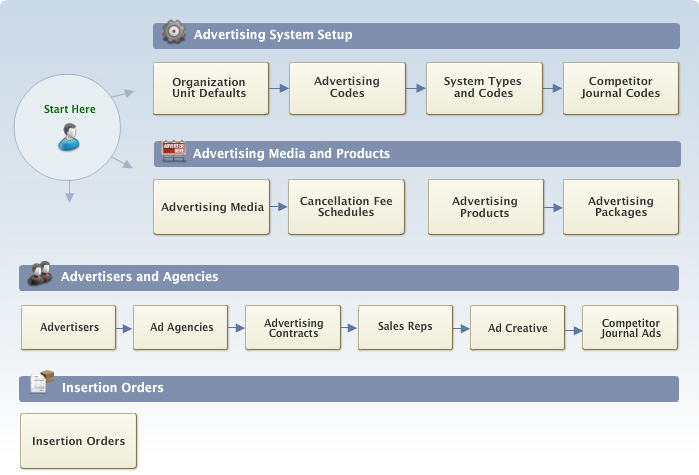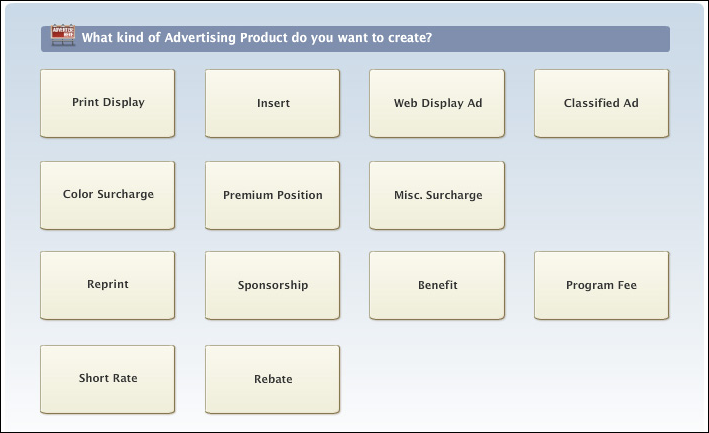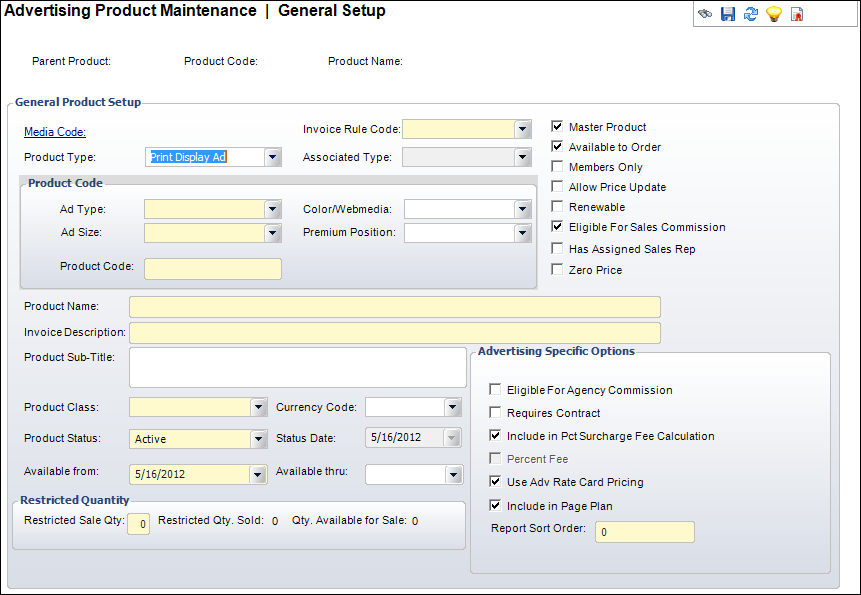
The Advertising Product Maintenance search screen displays.
To create a new advertising product:
1. From
the Advertising Central screen, click Advertising
Products from the Advertising Media and Products section.

The Advertising Product Maintenance search screen displays.
2. Click
Create New Advertising Product.
The Advertising Product Maintenance General Setup screen displays with
multiple advertising product type options:
· Print Display
· Insert
· Web Display Ad
· Classified Ad
· Color Surcharge
· Premium Position
· Miscellaneous Surcharge
· Reprint
· Sponsorship
· Benefit
· Program Fee
· Short Rate
· Rebate

3. Select
one of the options.
The Advertising Product Maintenance General Setup screen displays. The
selected option displays in the Product Type drop-down.

4. Click
the Media Code link.
The Generic Chooser displays with a list of Media Codes. Select a Media
Code. Optionally, the Media Code can be entered as text into the text
box.
5. The Invoice Rule Code automatically populates based on the Media Code selected. Change this if necessary.
6. If necessary, select a different Product Type from the drop-down.
7. If necessary, select an Associated Type from the drop-down.
8. Check the checkboxes that apply:
a. Master Product
b. Available to Order
c. Members Only
d. Allow Price Update
e. Renewable
f. Eligible for Sales Commission
g. Has Assigned Sales Rep
9. The Product Code text box is formulated based upon your selections from the Product Code Generation section:
· Select the Ad Type from the drop-down.
· Select the Ad Size from the drop-down.
· Select the Color/Webmedia from the drop-down.
· Select the Premium Position from the drop-down.
 Upon
selection and tab out of each Product Code Generation field, the Product
Code is automatically created by the system by combining the Ad Type Code,
Ad Size Code, Ad Color/Webmedia Code, and Premium Position Code.
Upon
selection and tab out of each Product Code Generation field, the Product
Code is automatically created by the system by combining the Ad Type Code,
Ad Size Code, Ad Color/Webmedia Code, and Premium Position Code.
10. Enter
the Product Name in the text box.
The Invoice Description defaults to the Product Name.
TMA Resources recommends that you include the name of the media, when entering
the Product Name. For example, instead of a product called “Classified
Ad”, call it “XYZ Magazine - Classified Ad”. This will help reduce confusion
when a user creates an advertising order from the Order Entry screen (not
recommended).
11. If necessary, change the Invoice Description.
12. Enter the Product Sub-Title in the text box.
13. Select a Product Class from the drop-down.
14. Select the Currency Code from the drop-down.
15. Select the Product Status from the drop-down.
16. Select the date this advertising product is Available from.
 The
Available From date cannot be changed if orders have already been created
for it.
The
Available From date cannot be changed if orders have already been created
for it.
17. Select the date this advertising product is Available thru.
18. Enter the Restricted Sale Qty (quantity) in the text box. This is used to restrict the number of times an advertising product can be sold and is primarily used for non-issue-based or non-term-based advertising media.
19. In the Advertising Specific Options section check the checkboxes that apply:
· Eligible for Agency Commission
· Requires Contract
· Include in Pct Surcharge Fee Calculation
· Percent Fee
· Use Adv Rate Card Pricing
· Include in Page Plan
20. Enter the Report Sort Order.
21. Click Save.
Screen Element |
Description |
|---|---|
General Product Setup |
|
| Media Code | Link and text box. The parent product. The parent product is always the advertising media. |
| Invoice Rule Code | Drop-down. Automatically populated based on the selected Media Code. Values in the drop-down populate based on the codes defined for the fixed ADV "INVOICE_RULE" system type. If the invoice rule is defined as term start date, the order line does not get invoiced until on or after the cycle begin date of the advertising order. If you set the start date of the ad to be a date that is greater than today, the order line will not get invoiced until on or after that date. If you set the ad start date to be less than today, then you order line will be created as invoiced. |
| Product Type | Drop-down. Displays the type of advertising product. For example, a print advertisement, Web advertisement, or sponsorship. |
| Associated Type | Drop-down. |
| Master Product | Checkbox. When checked, indicates this product can stand alone. When unchecked, indicates the advertising product is a surcharge. A surcharge cannot be added to an insertion order until the master advertising product has been added. |
| Available to Order | Checkbox. When checked, indicates this is an advertising product available for purchase by advertisers. |
| Members Only | Checkbox. When checked, indicates that only members can buy this advertising product. |
| Allow Price Update | Checkbox. If this checkbox is selected, the Unit Price field
is editable on the Order Entry screen and the Line Item Details
screen.
If the price of the product is $0 and this checkbox is selected, the Line Status will default to Proforma regardless of the Org Unit Line Status default. The system assumes that the price will be manually changed. |
| Renewable | Checkbox. When checked, indicates that this product can be renewed. |
| Eligible for Sales Commission | Checkbox. When checked, indicates that this advertising product
produces commission for the sales person when it is sold.
When a product rate code is defined for an advertising product where the "Eligible for Sales Commission" checkbox is checked, the "Sales Commission" percentage for the rate code is set to the "Commission Percent" defined on the Commissions screen in Organizational Unit Maintenance.
When the order line is created, the Order_Detail. SALES_COMMISSION_PCT is set to the "Sales Commission" percentage on the Rate Code screen in Product Maintenance. This is the sales commission percent for this order line. If more than one sales rep is added to the order line, this percentage amount is split among the sales rep, so that the total sales commission percentage equals the percentage defined here. |
| Has Assigned Sales Rep | Checkbox. When checked, indicates this product has a sales representative assigned. |
Product Code |
|
| Ad Type | Drop-down. This is the first of four fields that makes up the advertising product’s product code. Examples of Ad Type are, DISPLY, ARTCLE, BANNER, BUTTON, POPUP, etc. |
| Ad Size | Drop-down. This is the second of four fields that makes up the advertising product’s product code. This is used to identify the size of the advertisement. Examples of Ad Size are, EIGHTH, HALFPG, MEDIUM, TALL, etc. |
| Color/Webmedia | Drop-down. This is the third of four fields that makes up the advertising product’s product code. This field is not required, but can be entered for any advertising product. |
| Premium Position | Drop-down. This is the last of the four fields that makes up the advertising product’s product code. Examples of Premium Position are, BKCOVER, IFRCVR, HOMEPGG, CHKOUT, etc. |
| Product Code | Text box. The product code for this advertising product. This code is created based upon the selections made in the Product Code section. You are allowed to change the Product Code after the system generates it. |
General Product Setup |
|
| Product Name | Text box. The full name of this advertising product. |
| Invoice Description | Text box. Defaults to the Product Name. Allows you to further describe the advertising product. |
| Product Sub-Title | Text box. A secondary name for the advertising product. |
| Product Class | Drop-down. Displays the media in which the advertising product displays. |
| Currency Code | Drop-down. The appropriate domestic or international currency to use in this subsystem, e.g., German Mark, Japanese Yen, US Dollar. |
| Product Status | Drop-down. Displays the status of this advertising product. Valid values are, active, cancelled, or discontinued. |
| Status Date | Read-only drop-down. Displays the date the status for this advertising product was last updated. |
| Available from | Drop-down. The date on which this advertising product is available for sale. |
| Available thru | Drop-down. The date on which this advertising product is no longer available for sale. |
Restricted Quantity |
|
| Restricted Sale Qty | Read-only. This is used to restrict the number of times an advertising product can be sold and is primarily used for non-issue-based or non-term-based advertising media. |
| Restricted Qty. Sold | Read-only. The amount of times this advertising product has been sold. |
| Qty. Available for Sale | Read-only. The amount of this advertising product left to be sold. (Qty. Available for Sale = Restricted Sale Qty. - Restricted Qty. Sold) |
Advertising Specific Options |
|
| Eligible for Agency Commission | Checkbox. When checked, indicates that this advertising product produces commission for the agency after the advertiser has paid the invoice. |
| Requires Contract | Checkbox. When checked, indicates that this advertising product requires that a contract be associated with the order before it can be purchased. If the product is added to an order that does not have a contract, you are presented with a message, but are still allowed to purchase the product. |
| Include in Percent Fee Surcharge Calculation | Checkbox. When checked, percentage surcharge fees will default. Some types of advertising fees are not flat fees. The fees are calculated based upon a percentage of other fees in the insertion order. |
| Percent Fee | Checkbox. |
| Use Adv Rate Card Pricing | Checkbox. When checked, the product uses rate card schedule
pricing. The system automatically creates an advertising schedule
record and updates the advertising schedule ID to the Default
Advertising Schedule ID.
If left unchecked, pricing records are not populated with the Default Advertising Schedule ID and the Advertising Schedule field is not enabled for entry. If existing current pricing is defined with advertising rate card schedules, pricing continues to be calculated off of rate card schedules. Products that are percentage fees can not use rate card schedules for pricing. |
| Include in Page Plan | Checkbox. When checked, indicates the product should be included as part of the page plan. This is used for print advertisements, not for surcharges. |
| Report Sort Order | Text box. This is used in the rate card schedule reports as well as the media kit report. Those reports sort the product list first by Media Code, Report Sort Order (in ascending order), and then by Ad Type, Ad Size, Color/Webmedia, and Premium Position. |